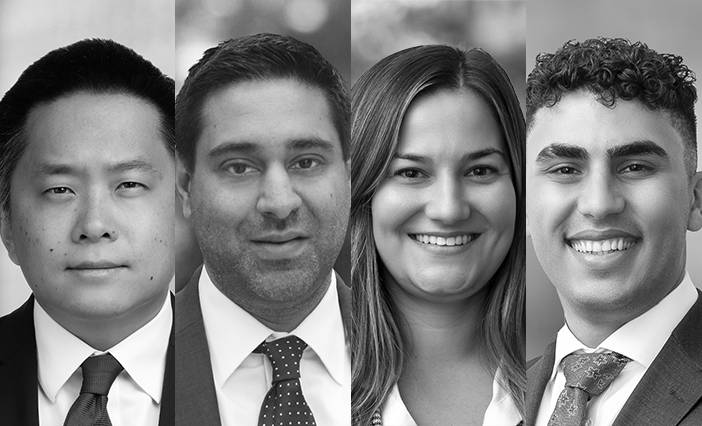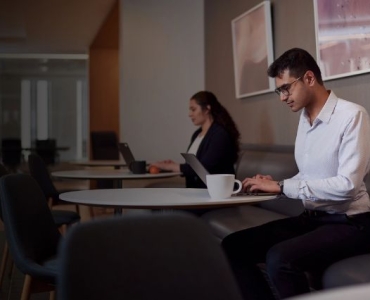
May 2025: In our new Battle of the Practices series, lawyers from two practices introduce us to what they do and explain the skills that you need to succeed in their team. Discover which area of the law could be the best fit for you, and get to know our people and our work.
First in the ring, Henry Huang, a partner in our Silicon Valley Intellectual Property (IP) team, is pitted against Chicago Mergers & Acquisitions (M&A) partner Shiva Sandill, with help from New York IP associate Angelika Kligos and New York M&A associate Yousef El Zohiry. Let the battle commence!
Round 1: Battle of the pitch
Give us your elevator pitch for working in your area of the law.
SS: Being an M&A lawyer is an engaging and dynamic experience, as the industry and market are continuously changing. This keeps me and my team on our toes. The M&A, private equity and venture capital space is an inherently strategic and business-focused practice, allowing us to interface with sophisticated clients, innovate founders, and savvy entrepreneurs. Our associates tackle exciting, complex transactions crossing a variety of industry verticals, making every day an adventure.
HH: We do a really wide range of IP work across the US—each of our offices handles multiple areas. Here in Silicon Valley, we work with some of the biggest tech companies on everything from AI to software. In Boston and New York, there's a focus on life sciences, and in Washington, it's often trademarks, copyright and patent work. The work is really interesting too, often headline-making issues for well-known companies.
Round 2: Day-to-day duel
Associates, what's your day-to-day like? Tell us about your typical tasks.
Y EZ: I work with lawyers handling specific workflows within an M&A transaction. It's very collaborative; we work closely with real estate lawyers, tax lawyers, maybe commercial litigation or our IP litigation team. I'd sum up a typical day as managing a big group of people to ensure that the necessary documents for a transaction are drafted, due diligence is completed on schedule and client questions are addressed promptly. I also want to emphasize M&A lawyers require research skills just as much as our colleagues in IP—for example, it is common to spend time looking at deal precedents for a new transaction.
At the same time, I'm also getting a deep understanding of the business and the entities involved in the transaction. This is typically achieved through due diligence, where I'll help identify any red flags that our client should be aware of before signing an agreement. Our findings ultimately shape the content of the transactional documents!
AK: My day-to-day is incredibly varied depending on where we are in the litigation cycle. I might be doing detailed research, reviewing documents during discovery, or working on reports or deposition outlines.
I also attend meetings with experts and provide input as to which experts are the best fit for our litigation strategy. Taking notes in meetings is another frequent task, as is drafting motions. Staying close to the detail of each case really helps me understand how we achieve the client's goals at every stage.
Round 3: Skills that seal the deal
What kind of person succeeds in your team?
SS: You need to thrive in a fast-paced environment, have strong interpersonal skills, and be organized, adaptable, and proactive. A genuine interest in understanding our clients' business, investment and strategic objectives is also key.
We are in the client services business; we help them make calculated business judgments and decisions based on our market knowledge, experience and expertise. As such, being able to communicate effectively and articulate issues clearly and concisely on a call, via email, or in a meeting is vital to our clients' ability to evaluate deal points while balancing their internal risk tolerance and goals.
HH: You need to pay attention to detail and to be organized. Staying on top of interview prep notes or a deposition outline is essential—we need to get it right and there are always a lot of moving parts. Second is advocacy skills; being able to take positions and support them. Having an idea, being able to support it in writing or orally is very helpful.
And then the third thing I'd say is just a curiosity to learn about technology. A science background is not required, but you have to be willing to think about science and tech, such as the code or chemical formulas that we're working on.
Round 4: Road to readiness
What advice would you give students who are interested in joining your practice area?
SS: While much of what you learn as an M&A lawyer is on the job, I recommend taking accounting, finance and corporate tax courses in law school. This foundational knowledge helps provide new associates with an understanding of our client's strategies and objectives, as well as the intersection between clients' goals and their financial and business models.
Communicating and understanding business terminology allows you to add even more value as an M&A lawyer. Completing our cross-border virtual learning program will give you a real sense of the work that we do and how we work with other teams.
HH: Take a patent law or intellectual property survey class if you can. Understanding what constitutes a trade secret or what happens after a patent expires will help you understand if this is an area of the law that sparks your interest. We host a 1L IP Workshop in our Silicon Valley office annually, and we have a virtual learning program too—both are great ways to engage with our work and meet our lawyers.
Round 5: The reality check
Associates, tell us what they don't teach you in law school
Y EZ: It is normal to feel uncomfortable and that you are out of your depth—an important skill is learning how to quickly familiarize yourself with the new matter or task to push the workstream forward. You need to be a team player and keen to learn. As an M&A lawyer, you will broaden your knowledge across many different areas of the law, such as sanctions or intellectual property, and how they impact cross-border transactions. Enjoy the learning process!
AK: Research skills are key. Any grounding that you can get in how to do quality research will be invaluable to you as a lawyer. Practically, learning to type quickly is something else that will be helpful every day. So-called soft skills: communicating effectively, taking notes, coordinating tasks—these will make that initial learning curve easier—our Business Communications virtual learning program is a great way to learn these skills. And being a team player too, of course.
Now that you've heard the arguments for both sides, could M&A or IP be the right fit for you?





